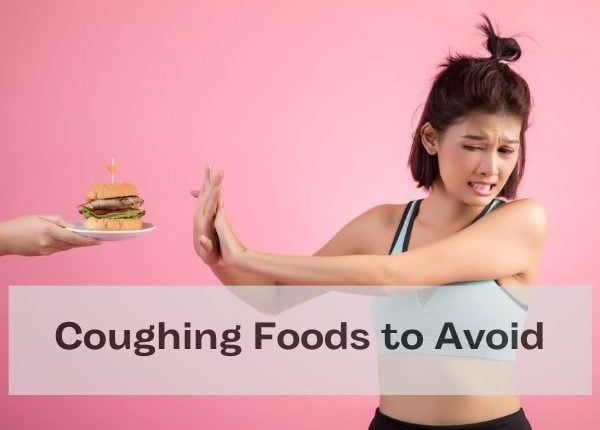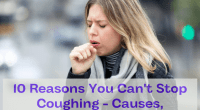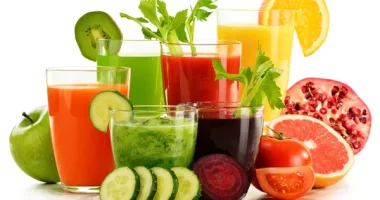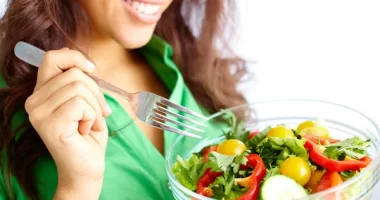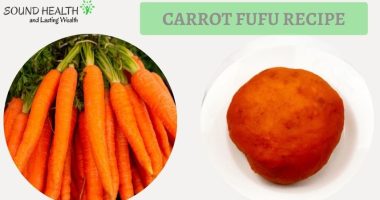Coughing is a common symptom of various respiratory illnesses. It can be triggered by allergens, irritants, infections, and even certain foods. While many foods can help boost your immune system and alleviate coughs, some can exacerbate the problem. In this article, we’ll look at some coughing foods to avoid, and what you should eat instead.
Table of contents
- Coughing Foods to Avoid: What Not to Eat
- The Best Foods to Eat for a Soothing Effect
- The Role of Hydration in Alleviating Coughing
- FAQs about Coughing Foods to Avoid
Also read | Are chest infections contagious? Signs your cough is not a common cold
Coughing Foods to Avoid: What Not to Eat
Spicy Foods:
Spicy foods like chili peppers, hot sauce, and curry can irritate the throat and exacerbate coughing symptoms. The capsaicin found in these foods can trigger a cough reflex, making your symptoms worse.
Dairy Products
Dairy products like milk, cheese, and butter can increase mucus production, making it harder to expel phlegm. Avoid them if you have a cough with phlegm.
Citrus Fruits
Citrus fruits like oranges, lemons, and grapefruits are high in vitamin C, which is beneficial for the immune system. However, they are also acidic and can irritate the throat, leading to coughing. Avoid them if you have a sore throat or a persistent cough.
Fried Foods
Fried foods, such as French fries and fried chicken, are high in fat and can cause inflammation in your body. Inflammation can aggravate your cough and make it worse. Instead of fried foods, try baked or grilled options to help alleviate your symptoms.
Processed Foods
Processed foods, such as packaged snacks and processed meats, are often high in sodium and preservatives, which can cause inflammation and aggravate your cough. Instead, opt for whole foods, such as fruits, vegetables, and lean protein, to help alleviate your symptoms.
Chocolate
Chocolate is high in caffeine and theobromine, both of which can worsen your cough. If you have a cough, it’s best to avoid chocolate until your symptoms improve.
Nuts
Nuts, such as peanuts and almonds, can cause irritation in your throat and worsen your cough. If you have a cough, it’s best to avoid nuts until your symptoms improve.
Alcohol
Alcohol can dehydrate the body and irritate the throat, which can worsen coughing symptoms. Additionally, alcoholic beverages like beer and wine can cause the body to produce more mucus, which can further aggravate coughing symptoms. To avoid exacerbating your cough, it’s best to avoid alcohol until your symptoms improve.
Carbonated Beverages
Carbonated beverages like soda and sparkling water can also trigger a cough reflex. The bubbles in these drinks can irritate the throat and cause coughing, especially if you already have a sore throat. To avoid exacerbating your cough, it’s best to avoid carbonated beverages.
Foods that You’re Allergic to
If you have a food allergy, consuming the allergen can cause an allergic reaction, which can worsen your cough. If you have a cough and a known food allergy, it’s best to avoid the allergen until your symptoms improve.
The Best Foods to Eat for a Soothing Effect
Warm Broths and Soups
Warm broths and soups are hydrating and easy to digest, making them perfect for alleviating coughs. They can also help soothe the throat and reduce inflammation.
Ginger
Ginger is a natural anti-inflammatory and can help alleviate coughs and sore throats. Add ginger to your tea or smoothie, or use it in cooking. Source
Honey
Honey has natural antibacterial and anti-inflammatory properties, making it an excellent remedy for coughs. It can help soothe the throat and reduce coughing.
Leafy Greens
Leafy greens like spinach, kale, and collard greens are high in vitamins and antioxidants, which can boost your immune system and help alleviate coughs. Source
The Role of Hydration in Alleviating Coughing
Staying hydrated is crucial for alleviating coughs. Drinking plenty of fluids can help thin mucus, making it easier to expel. It can also help soothe the throat and reduce inflammation. Aim to drink at least eight glasses of water a day, and avoid sugary and caffeinated drinks, which can dehydrate you.
FAQs about Coughing Foods to Avoid
Can chocolate trigger coughing? Yes, chocolate can trigger coughing in some people, particularly if it contains caffeine.
Can alcohol worsen coughing? Yes, alcohol can dehydrate the body, making it harder to expel mucus and exacerbating coughing.
Are there any coughing foods to avoid if you have asthma? If you have asthma, you should avoid dairy products, fried and processed foods, and foods that you are allergic to.
Can eating certain foods cause a cough? Yes, certain foods can cause a cough, especially if you’re allergic to the food or if it irritates your throat.
What are the best foods to eat when you have a cough? When you have a cough, it’s best to eat whole foods, such as fruits, vegetables, and lean protein, to help alleviate your symptoms.
Can drinking water help with a cough? Yes, drinking water can help keep your body hydrated, which can help relief your cough.
Can drinking tea help with a cough? Yes, drinking herbal tea can help soothe your throat and alleviate your cough.
Can I eat ice cream if I have a cough? It’s best to avoid dairy products, such as ice cream, when you have a cough as they can increase the production of mucus in your body, which can make your cough worse.
How long should I avoid these foods if I have a cough? It’s best to avoid these foods until your cough improves. Once your symptoms improve, you can slowly reintroduce these foods into your diet.
Conclusion
Coughing can be an uncomfortable and frustrating symptom to deal with, especially if it persists for a long time. While certain foods can exacerbate coughing, others can help alleviate it. By avoiding coughing foods like spicy, dairy, citrus, and processed foods, and incorporating foods like warm broths, ginger, honey, and leafy greens into your diet, you can help soothe your cough and boost your immune system. Staying hydrated by drinking plenty of water and avoiding sugary and caffeinated drinks can also help alleviate coughing. By making these simple dietary changes, you can help your body recover from a cough and promote overall health and well-being.
Remember, if you have a persistent cough or any other respiratory symptoms, it’s important to seek medical advice. A healthcare professional can help you determine the underlying cause of your cough and provide appropriate treatment. In addition to dietary changes, there are many other things you can do to help alleviate coughing, such as getting plenty of rest, avoiding irritants, and practicing good hygiene.
Don’t miss | Why Am I Coughing So Much But Not Sick?
